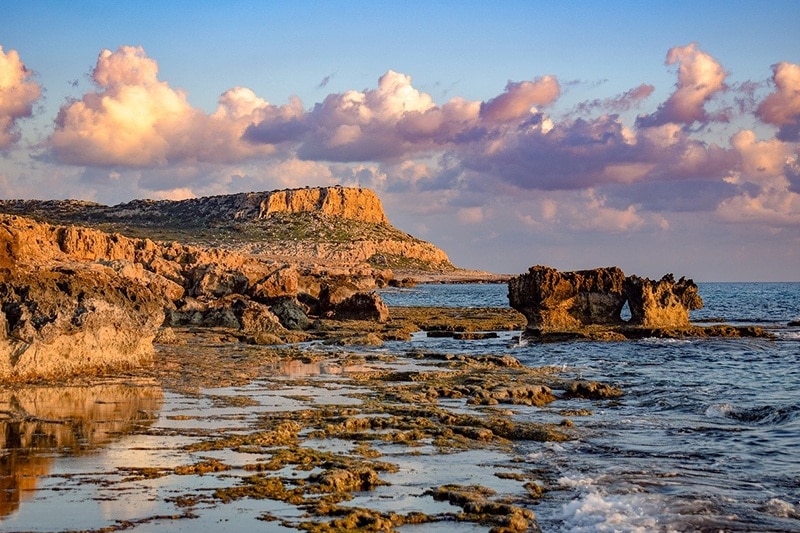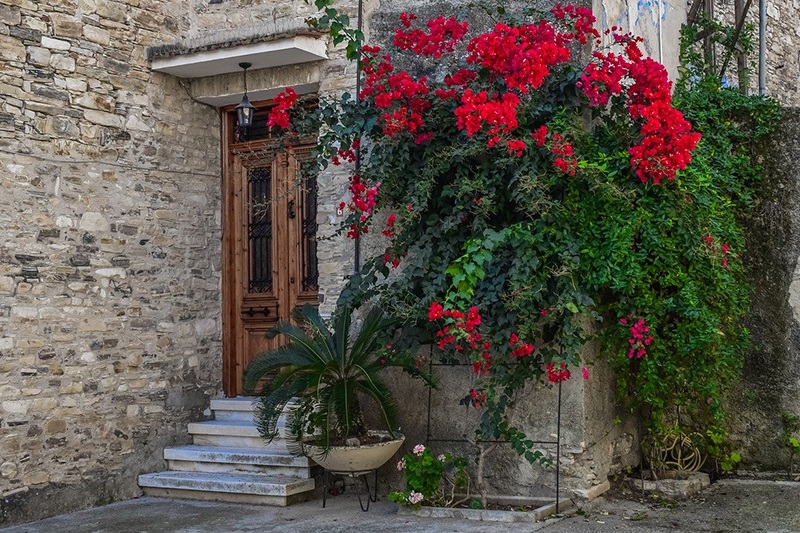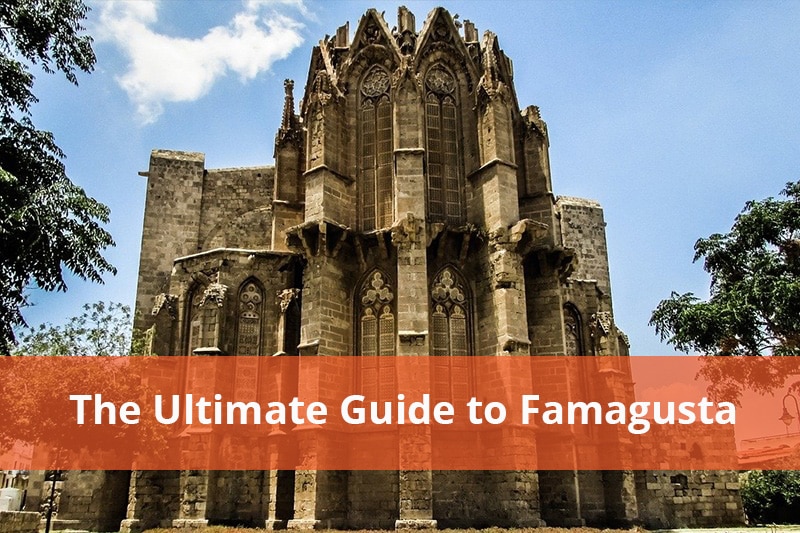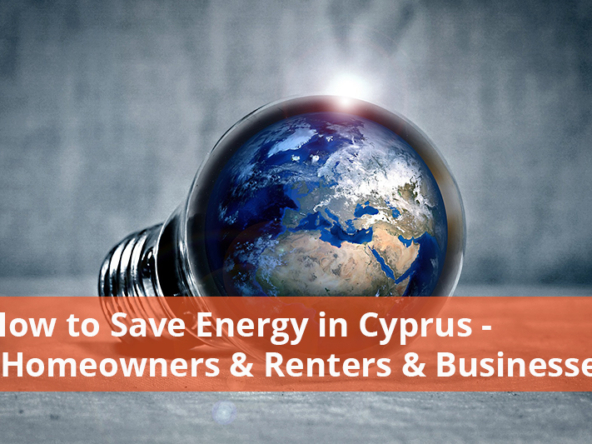Located on the east coast of Cyprus, the district and city of Famagusta fascinate tourists and locals alike – from medieval architecture to quality of life, beautiful nature, and many opportunities for business and investment.
In this week’s blog article by Property Experts Cyprus, we present the ultimate guide to Famagusta with all its facets – from living in this beautiful city and district to real estate, education, healthcare, and more.
The birth of Famagusta
The city was founded around 274 BC and is also known as Gazimağusa in Turkish. In Greek, it is called Ammochostos (Αμμόχωστος), meaning “hidden in the sand.” Today, the nickname of the district is the “district of churches” and Famagusta’s old town is lovingly called the “city of 365 churches” because of its many churches in the 14th century – one for each day of the year.
Famagusta was originally a fishing village. During the medieval period, the city became the island’s most important port and a gateway to trade, in particular along the Silk Road. Famagusta was booming at the time!
And with the revival of the New Silk Road, Chinese trade commerce is flourishing once again. The Chinese value the real estate investment opportunities in Cyprus. So, let’s start the ultimate guide to Famagusta with its history.
History
In the 19th century a period of occupation. In 1878 the island of Cyprus came under British control. In 1974 a Greek military coup aimed to unite the island with mainland Greece. However, this led to a Turkish invasion. This resulted in a division of the island between Turkish Northern Cyprus and the Greek Cypriot Republic of Cyprus. This division remains until today.
At the same time, in 1974 Famagusta was bombarded by Turkish aircrafts and within 2 days the residents of Varosha, a booming resort suburb, as well as the whole Famagusta area fled to the south of Cyprus, fearing a massacre. Since then the Varosha suburb was locked down and fenced off by the Turkish army. The area strangely became a tourist attraction. In fact, it was a ghost town or so-called “forbidden city” until the end of 2020, when Varosha was reopened by the Turkish.
But don’t worry! If you are planning on living in Famagusta, you don’t have to be afraid of this conflict area as it does not impact daily life. The clash happened 40 years ago and it has been peaceful ever since. In fact, this history leads to a vibrating community today, where Turkish and Greek live together side by side, with their culture, traditions, foods, and customs.
Famagusta city
The city of Famagusta is located in the east of Cypriot island, a 45-minute drive away from Larnaca International airport. With more than 42,000 inhabitants, both Greek and Turkish Cypriots, Famagusta is the fourth largest city in Cyprus.
Its ramparts with Venetian walls date back to the Middle Ages and its port is still a sight to behold. Besides, Famagusta’s mosques and the famous Othello castle attract thousands of tourists each year.
Living in Famagusta surely offers many advantages – beautiful nature, business, and real estate opportunities and a relaxed Mediterranean lifestyle. This ultimate guide to Famagusta reveals all you need to know.
Nature
Famagusta district is one of Cyprus’s six official districts. The major cities in this district are Agia Napa and Protaras, both coastal resort towns known for their beautiful Cyprus beaches, and Paralimni, home to many people working in the aforementioned cities.
One of the hallmarks of this region, Cape Greko, is a protected nature park known for its scenic cliffs and wildlife. With its beautiful view onto a calm, turquoise sea, the Famagusta coastline attracts those who like to mix a sea holiday with cultural activities.

The area is continuously voted to have the best beaches in Europe. The sandy beaches also attract many tourists, especially in the resort area of Agia Napa. Overall, the Famagusta district is a large part of the country with a lot to offer, from cities to towns, tourist resorts to true local spots.
Famagusta is also famous for many so-called Blue Flag beaches, which refers to sustainable beaches with high-quality water and safety standards. Nissi Beach in Agia Napa may be among the most popular and beautiful Blue Flag beaches in Famagusta. You will find many resorts and all-inclusive hotels there, as well as the only Hard Rock Cafe in Cyprus.
Culture and Sights
Famagusta is rich in culture and history. Among its most famous landmarks are the huge, honey-colored gothic cathedral from the 14th century Lala Mustafa Pasha Mosque, Othello’s castle, and the Palazzo del Provveditore (Venetian Palace).
Also, don’t miss the Famagusta City Walls with well-preserved Venetian walls, the Porta Del Mare gate with its iron door and statue of a winged lion, as well as the Namik Kemal Dungeon. Visitors find an abundance of monuments to explore, and even the locals like to pay a regular visit to some of the city’s most beautiful spots.
Aside from its famous monuments, the cultural life of Famagusta is also well known for its casinos, hotels, and festivities with art, music, and theatre which are among the best on the island.
Don’t miss the Famagusta Art and Culture Festival that takes part every year in July. It showcases talents in the fields of theater, music, and dance. Locals and tourists alike rush to get tickets for it each year.
The commercial hub of Cyprus
The main economic activities in Famagusta are tourism, education, construction, and industrial production. With its favorable tax and business regulations, Cyprus is among the most popular destinations in Europe for business owners, entrepreneurs, and digital nomads.
In fact, Cyprus is one of the best places to start a business, for example, a Cyprus Ltd. in the European Union: it has a low corporate tax, and even offers several tax incentives to foreign investors and new residents. The whole island is home to a large number of expats, which also makes it easier to find work in an English-speaking company.
For the maximum number of business opportunities, potential expatriates may want to have a look at living in Larnaca, expat life in Paphos, enjoying life in Limassol, and Nicosia – Cyprus’ capital. But the Famagusta district also has a lot to offer! The high number of tourist resorts along the coast makes it a great place for workers and entrepreneurs in the tourism sector. And if you can work or start a business remotely, then why not choose to do it on the island’s best coastline?
Education in Famagusta
For expatriates looking to move to Cyprus, education is often one of the main concerns. Living in Cyprus essentially offers two options: to take advantage of the free, public education, or to pay for private schools, which teach in English.
Living in Famagusta is no exception to that rule. Although the city boasts a large number of primary and secondary public schools, private ones are a bit rarer on this side of the island. Though you won’t be spoiled for choice, your options are still good.
The public Famagusta Namık Kemal High School in Famagusta city and Xenion High School in Paralimni city, for example, have a good reputation. In terms of higher education, Famagusta gives you a bit more choice. The district is home to the public Eastern Mediterranean University as well as the InterNapa College in Sotira city and the Atlantis College – both private institutes. All of them offer a good range of courses, some of which are even taught in English.
Healthcare in Famagusta
The national health system (NHS) or GeSY in Greek is the official health insurance system of Cyprus. Since March 2019 this program covers out-of-hospital care with only a very small own contribution rate. Since summer 2020, in-hospital care is included in this program. To access free healthcare in Cyprus, you need to contribute to the state social security program.
Public healthcare is accessible free of charge to all European Union citizens as long as they are taxpayers and expats who have the Cyprus permanent residency permit. International citizens will find the prices generally affordable. There are a few different health insurance options, that are considerably cheaper than on the rest of the European continent.
In the Famagusta district, there are several public and private hospitals, including the well-known Famagusta Life Hospital in Famagusta city. In Agia Napa, you will find the renowned Napa Olympic Private Hospital. And the reputable Famagusta General Hospital is located in Paralimni.
Among expatriates, private hospitals are the more popular choice, as they are more likely to have English-speaking staff, and offer even better quality than public hospitals.
With its excellent level of healthcare, Cyprus medical tourism is booming. From robotic surgery to specialized treatments like limb lengthening surgery, Cyprus is a great place to combine health and travel. The Mediterranean environment is ideal for recovery.
Weather in Famagusta
Like most of the Cypriot islands, the summers in Famagusta are hot, humid, dry, and clear, while the winters are rather cold, windy, and mostly clear. Expect temperatures between 21°C and 34°C during the summer months (June – September). In the colder winter months between December and February, temperatures can go down to 8°C to 19°C.

Just like on the rest of the island, you will get a lot of sunshine year-round, and very little rain. The water temperature goes up to up to 28°C in August, which is also part of the reason why so many tourists show up in Agia Napa around this season. The average annual water temperature is around 22°C and the lowest average water temperature is 16°C.
Real estate in Cyprus and Famagusta
Real estate prices in Famagusta vary quite a lot. While part of the district offers mostly reasonable rent prices, parts of the Famagusta coastline also attract the very rich and real estate investors.
You will find stunning sea-side apartments and houses for sale as an investment or as your own residence. At the same time, there are more affordable options, in particular in the cities.
New construction projects in Cyprus can be observed all over the island to boost the economy. In Famagusta, projects have been created that aim to turn the district into a hub of sustainable living. For example, Famagusta is on its way to becoming Cyprus’s next “ecocity“. The goal of the project? To have the whole city powered by solar energy, and be completely sustainable with its waste. Besides, the large Agia NapaMarina is under construction, a huge investment project.
The Ultimate Guide to Famagusta
Now that you have read the ultimate guide to Famagusta, you know everything about living in this beautiful district. If you are planning to retire in Cyprus, start your own business, work as an employee or digital nomad, Famagusta has a lot to offer!
The beautiful sandy beaches are among Cyprus’ and Europe’s finest, although you won’t have them all to yourself during the tourist summer months. At the same time, this offers many business and investment opportunities in the tourism, real estate, and construction sectors.
Expats in Famagusta value the area for its nature, culture, and low cost of living compared to European cities. So why not move to Cyprus, and elect this gorgeous and fascinating region as your new home?
We at Property Experts Cyprus are happy to answer your questions about relocating to this beautiful Mediterranean island. From buying Cyprus real estate as an investment or own home, Cyprus company set up, insurances, and many other services you may find interesting – we are here for you! Contact us now.


